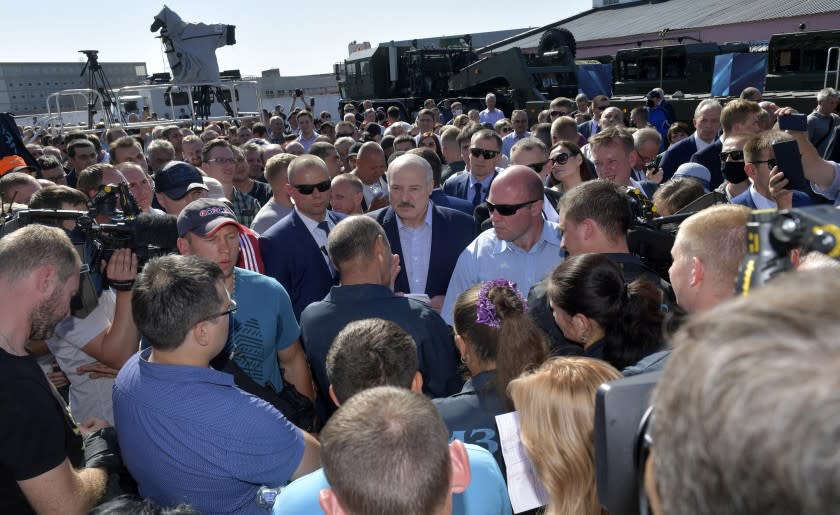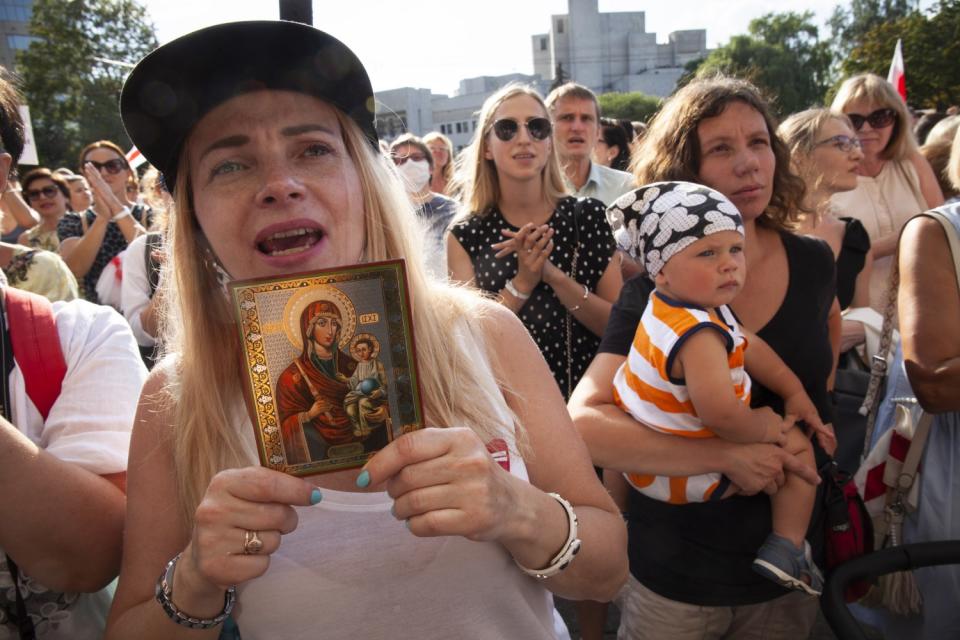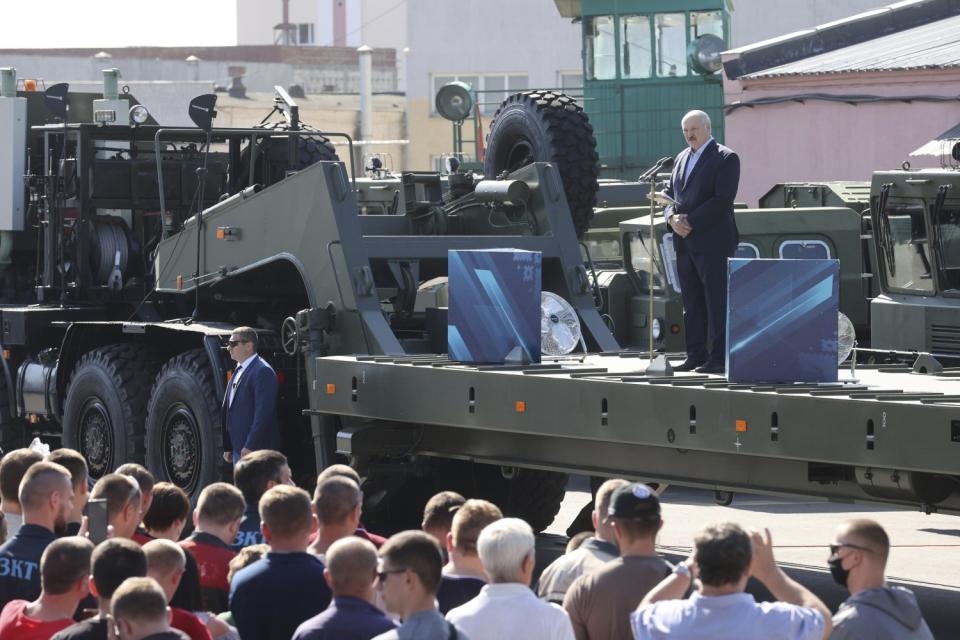'Go away!' Workers heckle Belarus leader as support collapses around him

The social media images were pitiless: the look of utter incomprehension that flashed across the face of Belarusian President Alexander Lukashenko when workers at a state-owned factory — a core constituency during his decades of authoritarian rule — jeered and heckled him.
“Ukhodi!” workers at the vehicle factory on the outskirts of the capital, Minsk, shouted at the 65-year-old embattled leader on Monday after he helicoptered the short distance there to address them, apparently expecting the usual rote display of support. “Go away!”
Lukashenko's security handpicked the most loyal MZKT factory workers to listen to Lukashenko. Didn't help. "Go away!" - chanting the workers!#ЛукашенкоУходи #LukashenkoGoAway#Belarus pic.twitter.com/IlXdjgPIVc
— NEXTA (@nexta_tv) August 17, 2020
With strikes at state-owned enterprises gathering pace and many workers laying down their tools to join in popular protests that have rippled across Belarus, Lukashenko’s seeming loss of backing by those who toil in the former Soviet republic’s heavy industries might well prove a tipping point in the week-old uprising, analysts say.
The stunning sight of Lukashenko being repudiated, even mocked, by industrial workers — whose livelihoods have traditionally been tied to unquestioning loyalty to the state — brought to mind decades-ago scenes of revolt from countries such as Poland and Romania, which until the late 1980s were part of the postwar Soviet bloc.
“There was a kind of social contract, with workers especially, and it has broken down,” said Andrew Wilson, a senior policy fellow at the European Council on Foreign Relations. He and others cited factors, including economic hardships, that have befallen the country, particularly its increasingly moribund state enterprises, as Russian subsidies dried up.

Opposition calls for a general strike were affecting operations at some giant state-run Belarusian manufacturers of textiles and fertilizer, according to news reports, despite Lukashenko ordering workers to stay on the job. More than 5,000 striking workers from a huge tractor plant marched in the capital on Monday, the Associated Press reported from Minsk.
The unrest in Belarus is unfolding swiftly, but it has been years in the making. What critics describe as an almost laughably fraudulent presidential vote on Aug. 9 — after which election authorities declared that more than 80% of the ballots were cast for Lukashenko — galvanized a mass opposition movement not only in the capital, but also in far-flung towns and cities in the country of 9.5 million.
Over the last week, heavy-handed measures by the authorities against peaceful protesters — street beatings, horrendous jailhouse conditions for thousands of detainees, most since released — not only failed to quell the demonstrations, but also provoked more anger and widened participation by mothers and teachers, teens and pensioners.
The echoes of past uprisings that led to an end of Soviet rule beginning in the 1980s are radiating across Belarus, where Lukashenko, a caricature of a Cold War autocrat who took power in 1994, faces the most pronounced threat of his political life.
In both Poland and Romania, anti-government uprisings that might otherwise have been summarily snuffed out gathered unstoppable force when laborers — politically repressed by the state like other citizens, but long rewarded with a steady job and an array of paternalistic benefits — threw in their lot with the forces of social and political change.
In Poland, the Solidarity trade union born at the Gdansk shipyard sounded a metaphorical death knell for Communist rule, with tanks and martial law proving unable to suppress the movement. In neighboring Romania, the death knell was literal: After disaffected workers helped fuel an uprising against the brutal rule of Nicolae Ceausescu, the longtime dictator and his wife, Elena, were executed by firing squad on Christmas Day in 1989.
In Belarus, workers’ sense of betrayal by Lukashenko has been compounded by his mishandling of the country’s worsening coronavirus outbreak. Close-quarters work in sprawling state factories, and a near-total lack of any precautions, has led to rampant infections at industrial sites, human rights groups allege.
“Under such conditions, people no longer feel that the state offers them any protections,” said Anais Marin, an analyst with the British think tank Chatham House who also serves as a special rapporteur on Belarus for the U.N. Human Rights Council.
Analysts also said workers — many already angered over moves to privatize state enterprises and sell them to Russian interests — resented Lukashenko’s weekend appeal to Russian President Vladimir Putin for assistance. Putin’s response was calculatedly narrow, offering protection against foreign aggression but omitting any mention of helping the president counter domestic threats.
Leaked and widely disseminated video and audio from Lukashenko’s bruising encounter on Monday with workers at the state-run MZKT factory, which makes military vehicles, showed the extent to which he mistakenly relied on a pliant response to the last week’s tumultuous events.
“They are talking about unfair elections,” he said at one point. Instead of demurring, as he seemed to expect, the listening workers shouted: “Yes!”
Lukashenko has refused demands for a redo of the Aug. 9 vote that many believe was won by his main challenger, Sviatlana Tsikhanouskaya, who fled the country under pressure from the authorities, but has been rallying support from exile in neighboring Lithuania.
In a video statement on Monday, perhaps her boldest yet, Tsikhanouskaya declared herself the true election victor and offered to serve as interim leader during preparations for a new vote.
Marin, the analyst, said despite abundant signs of discontent, it was difficult to say whether state workers seeking Lukashenko’s ouster were solidly in the majority, or simply the most vocal.
“Each enterprise has its own balance of forces,” she said. “The situation is very volatile.”
In recordings made at the vehicle factory, Lukashenko — employing classic authoritarian language — sought to justify the harsh crackdown on demonstrators, telling workers that without such a show of force, “there would be no country.”

But he seemed rattled by the increasingly apparent spread of narratives of defiance, despite authorities’ efforts to curtail social media and to prevent foreign journalists from covering the election and its aftermath.
On Monday, Lukashenko spotted a factory worker seemingly attempting to record the scene — a gesture that only recently might have been viewed benignly as sign of homage, a worker’s respectful wish for a souvenir of his personal encounter with the all-powerful leader.
This time, the president shouted: “Put your phone down!”


